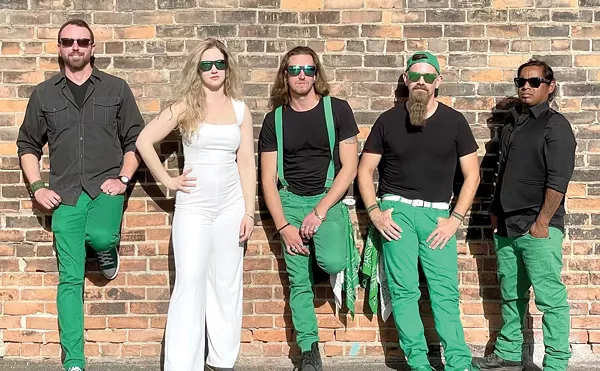Mathematicians working the abstract realms of number theory rank themselves by Erdos Numbers. If you puzzled over the riddles of prime numbers or such with the great theoretician Paul Erdos, you’re a 1. Worked with a 1, you’re a 2. Worked with a 2, you’re a 3, and so on goes the pecking order.
George Russell may not be the biggest name in modern jazz, but if you ranked his rings of influence, you’d find that 1s included such stars as Miles Davis, John Coltrane and Bill Evans. And while David Baker may not be the biggest name in Russell’s first ring, his importance shouldn’t be underestimated: Baker stands at a busy intersection where play meets theory, where performance meets education, and where the jazz tradition meets the Western classics.
He’s a spirited septuagenarian who radiates a swinging sunniness in talk, even if it’s faded some from his walk. He sat over coffee while in town a couple weeks ago, looking back at a career that includes coming up under Indianapolis cats like Wes Montgomery and J.J. Johnson, becoming a pioneer in jazz education and, just now, being featured as the composer-in-residence of this year’s Great Lakes Chamber Music Festival.
But of all those musical experiences, his time in Russell’s sextet and learning Russell’s theory sounds a booming bass note. Musically, says Baker of Russell, “he’s one of my reasons for being.
“If it hadn’t been for George, I don’t know what we would have taught,” he says.
Explaining exactly what Russell did to a layperson may be no easier than conveying an Erdos proof. But suffice it to say that with his Lydian Chromatic Concept of Tonal Organization, Russell is credited with seeing a liberating logic to the maze of possibilities that Charlie Parker and Dizzy Gillespie opened up with bebop. You might think of Russell as the often-overlooked link between bopping roller-coaster rides on “I’ve Got Rhythm” and the smooth sailing of Miles Davis’ “Kind of Blue.” But that’s one small example of the theory in action.
Moreover, it’s a theory of music, not just jazz. In fact, cautions Baker, it’s more than a theory — it’s a “life commitment.”
“Virtually everybody who is important in this music, even today, is one or two degrees of separation from George,” says Baker. “They may not even know it, but George opened our paths. If you talk about the Rosetta stone, that’s George.”
Similarly if you talk about bringing this Rosetta stone to the masses, you have to talk about Baker and what he calls a “blessing in disguise.” He’d always had an interest in teaching, but he specifically returned to academia in a time of crisis. A jaw injury sustained in an auto accident finally became so bad he was unable for years to play his trombone — so much for the up-and-coming voice on his instrument. So, in his 30s in the 1960s he took up the cello and the teacher’s chalk stick at Indiana University, his alma mater, and soon found himself starting up one of the nation’s first degree-granting jazz programs.
Back then, he muses, all the jazz instructional material available could be advertised in a half-page of Down Beat magazine. Baker and his contemporary Jerry Coker began filling the vacuum. Today the main catalog for jazz instructional materials runs 60 or 70 pages. And when he sees a new book on improvising, Baker admits that he can’t resist flipping to see whether he and Coker made the index. If they’re listed, he figures the author just took some of their stuff. If not, “they stole all of it,” he says with a blast of a laugh.
As part of the shift from the bandstand to the groves of academia, he’s also put an emphasis on composing for players coming from the European classical tradition — and it’s his notable career in that realm which brings him to the chamber music festival as this year’s composer-in-residence.
“We’re always trying to stretch ourselves and stretch the audience,” says festival executive director Maury Okun. “We’ve had really world-class composers. David’s background is different — the place where he comes from is different from somebody like John Harbison, who was his immediate predecessor. But his music is nonetheless incredibly interesting.”
Baker explains that for the improviser, the choice of the right phrases out of all the possibilities “has to happen instantaneously.” For the composer, “there’s the benefit of an eraser” and, hopefully, “clarity of invention that you might not get when you play.”
And thanks to the car wreck, Baker has found a life where he can have some of both, even though he felt lost and unsure of what to do with his life when he thought his tromboning days were over.
“I can remember when I was in the hospital, and saying, Why me? And then a voice said, ‘You never said once, Why me? when things were going good.’”
Baker laughs again. That’s when he stopped feeling sorry for himself. (Miraculously, years after he’d given up the trombone, he realized that his jaw had unexpectedly healed to the point that he could resume.)
Of his life today, he says simply: “I can’t think of anybody I’d rather be than me — or anyplace I’d rather be.”
And during the festival, come June 23, Russell’s 80th birthday, Baker will make his annual phone call to his mentor to say thanks for the help along the way.
Check out the schedule for this year's Great Lakes Chamber Music Festival W. Kim Heron is the managing editor of Metro Times. E-mail [email protected].






